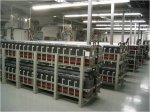ProtoSD and cyberjock are basically right on with the "don't do this" advice. However, I'd like to expand a bit.
Modern power supplies are based on a switching design, replacing old linear regulated supplies that effectively burned off ("dissipated") unwanted power as heat in order to arrive at the correct amount of power. Switched power supplies dissipate much less energy. However, they are significantly more complicated, requiring a careful and thoughtful design that marries transistors, capacitors, and inductors ... and typically a well-designed supply can push a good bit beyond its design specs for a brief time. Inability to sustain load is a sign of failure in progress, and with the voltages and stresses present within a power supply, you are likely to get additional failures in the near future as additional components overheat/melt/burn/short out.
Propping up the 12V (or 5V or whatever) with a capacitor to smooth might seem like a good idea, but it isn't. The typical ATX power supply may be supplying 40-80
AMPS of power, and that ought to be run through very heavy wire (6 AWG probably to handle the load, somewhat less might be okay to handle "boost"). But you have some serious hook-up issues: the 12V inside the power supply is passed to the connectors on 18 or (maybe if lucky) 16 AWG wire, you can't just clip on to one of those wires and hope for the best. Worse, many power supplies have multiple 12V rails, where independent current limiting circuitry (and who knows, maybe even independent 12V regulation?) is used on some of that, so you can't just tie all the 12V together outside the supply and then redistribute through a custom harness... So unless your capacitor is hooked up with a Frankenstein rig that takes all of these things into consideration, DANGER. And if your capacitor is hooked up with such a Frankenstein rig, EVEN MORE DANGER.
Here, a little fun reading to scare you a bit.
But really, what this does is to subvert the whole
PWRGOOD mechanism, because powering on is one of the major stressors in a power supply's life. cyberjock made a basically-equivalent point already but it's so important it deserves repeating. If PWRGOOD is indicated, the motherboard is being told that the power is stable and that CPU operations can commence. If the supply is already struggling to deal with your system's load, adding caps isn't doing it a favor.
If your power supply is incapable of powering your server without letting bad things through,
REPLACE THE FSCKING SUPPLY. For a FreeNAS box, presumably you've got several hard disks, memory, CPU, chassis, so the average FreeNAS user probably has at least $500 invested in their system. FreeNAS users have probably chosen FreeNAS because they want ZFS to protect their data. But part of protecting your data is not engaging in risky behaviours to begin with. You wouldn't just pile all of your hard drives on the bottom of your chassis in a heap and expect that to be a good way to run them, would you?


